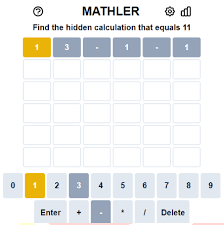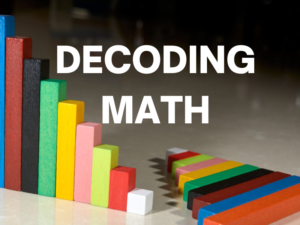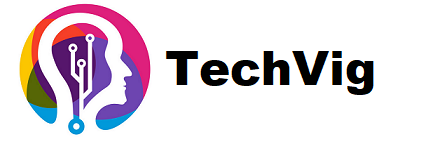Mathler is an exhilarating platform that offers daily arithmetic tasks. It is ideal for individuals who have a strong interest in mathematics, regardless of their age. Mathler is a tool that can enhance your mathematical abilities, whether you already have a passion for numbers or are just beginning to develop one.
Mathler offers a diverse range of puzzles that enhance the enjoyment of learning. Every puzzle has unique problems. At Mathler, you will engage in solving equations, deciphering communications, and addressing intricate difficulties.
Commencing your daily mathematical endeavour with Mathler will evoke delight and a sense of fulfilment. By successfully resolving difficulties, you will not only improve your skills but also experience a sense of satisfaction and accomplishment. Mathler is here to facilitate your journey of educational exploration and enjoyment.
Enrol in Mathler today and connect with fellow math enthusiasts. Allow it to lead you through exhilarating everyday mathematical challenges. Mathler is a tool that grants you access to the realm of numbers and enjoyment.
Overview:

Introducing the definitive manual for achieving mastery in Mathler! Suppose you are a student facing difficulties with mathematical ideas or an individual looking to improve your skills. In that case, this all-inclusive article will serve as a guide to help you achieve success. We will thoroughly explore efficient ideas, validated techniques, and expert advice to assist you in mastering Mathler with assurance and simplicity.
What is Mathler and How Does It Engage Intellects

The Origins and Concept of Mathler
Mathler’s objective is to transform mathematics into an enjoyable and accessible subject for all individuals. The method employs puzzles and games to foster captivating educational experiences. The conception of this notion arose from the need to provide individuals with daily challenges that combine enjoyment with mathematics. Mathler transforms math puzzles into games, infusing excitement into the subject for everyone.
The Significance of Mathler Beyond a Mere Game
Mathler is a cognitive-enhancing game that stimulates unconventional thinking to resolve difficulties. Its use of enjoyable and engaging elements enhances the process of learning mathematics, allowing individuals to improve their mathematical skills unconsciously.
The Psychological Attraction of Mathematical Challenges
Mathler’s difficulties provide a profound sense of accomplishment. Engaging in the resolution of challenging mathematical issues enhances one’s self-esteem. The satisfaction derived from completing a challenging puzzle and triumphing over complex mathematical problems ignites an enthusiasm for acquiring knowledge, particularly in the field of mathematics.
Comprehending Mathler: Decoding the Fundamentals

This section will examine the fundamental notions of Mathler, encompassing its origins, essential principles, and central components. Acquire a comprehensive comprehension of the content and significance of Mathler, as well as its crucial role in achieving mathematical expertise.
The Origins of Mathler
Explore Mathler’s historical origins and development. This groundbreaking method in mathematics education has influenced contemporary approaches to learning.
Fundamental Principles of Mathler
Examine the fundamental principles that form the basis of Mathler, including problem-solving, critical thinking, and mathematical reasoning. Discover how these principles constitute the fundamental basis of achieving proficiency in mathematics.
Fundamental Elements of Mathler
Enumerate Mathler’s fundamental constituents, encompassing mathematical principles, algorithms, and methodologies for addressing problems. Acquire a profound grasp of how each element leads to a comprehensive comprehension of mathematics.
The Emergence of Daily Cognitive Challenges in the Digital Era
The rise in popularity of daily puzzles, such as Mathler, can be attributed to various factors.
In the contemporary day, individuals derive immense pleasure from resolving daily cognitive challenges such as Mathler. These puzzles are readily accessible on our cell phones and PCs. These puzzles maintain mental acuity and provide enjoyment for individuals of all ages. Engaging in this activity is an excellent method of enjoying oneself while ensuring optimal cognitive fitness.
The Influence of Digital Brain Teasers on Learning
Games such as Mathler not only provide entertainment but also facilitate learning. They stimulate critical thinking, prompt problem analysis, and facilitate solution generation. By completing these puzzles, we enhance our problem-solving skills and deepen our comprehension of mathematics.
Investigating Complex Mathematical Principles
This section will explore advanced mathematical principles and procedures, equipping you with the necessary tools to solve complex problems confidently.
Proficiency in Algebra
Acquire proficiency in the fundamental concepts of algebra, such as equations, inequalities, and functions. Develop the skills to manipulate algebraic expressions and solve equations, enabling you to harness algebra’s full potential in problem-solving.
Geometry and Spatial Reasoning
Delve into the realm of geometry and spatial reasoning, acquiring expertise in topics such as angles, forms, and spatial relationships. Enhance your ability to visualize and intuitively understand geometric concepts to solve geometric issues efficiently.
Advanced Calculus and Higher-level Mathematics
Explore the domain of calculus and advanced mathematical analysis, including subjects such as derivatives, integrals, and differential equations. Discover the inherent elegance and effectiveness of calculus in representing and analyzing real-world occurrences and tackling intricate mathematical challenges.
Becoming Proficient in Mathler: Techniques and Advice
In order to excel in Mathler, it is imperative to employ intelligent tactics and utilise practical advice. Here are a few effective strategies:
Engage in frequent practice: It is of the utmost importance to dedicate time to practice consistently. Regularly engaging in Mathler’s problems enhances your mathematical proficiency. In addition, your ability to solve problems becomes significantly more acute.
Analyse intricate problems: Complex, challenging issues might be more manageable when they are divided into smaller components. This enables you to comprehend and resolve them with more ease.
Request further explanation: If a task is really challenging, seek assistance. Mathler provides online forums and tutorials specifically designed to address challenging mathematical topics. Utilising them can enhance your comprehension.
Additionally, there are helpful suggestions:
Efficient time management is essential for success at Mathler. Ensure that you maintain a harmonious equilibrium between speed and precision while solving puzzles.
Utilise abbreviations: Acquire practical mathematical techniques for quick calculations. They facilitate the resolution of challenging challenges by streamlining and expediting the process.
Maintain composure in high-stress situations: Mathematics might be challenging, but it is essential to remain composed. Stress can impede problem-solving abilities. Therefore, continue to inhale and exhale deeply, concentrate, and maintain a calm and rational mindset.
The Impact of Mathler on Education and Learning
Mahler: A Valuable Tool for Mathematics Practice
Mathler is not merely a platform for solving math puzzles; it encompasses much more. It is an effective instrument for honing mathematical skills. Mathler offers customers a diverse selection of puzzles to engage with various mathematical subjects. These encompass a wide spectrum of mathematical concepts, ranging from fundamental arithmetic to intricate problem-solving techniques.
Consistent practice with Mathler helps establish robust mathematical groundwork. Additionally, it enhances your numerical abilities.
Promoting the development of logical reasoning skills through the use of puzzles
Mathler is highly effective in fostering logical reasoning skills. The riddles presented in this activity require participants to engage in profound thinking, identify patterns, and arrive at logical solutions. This procedure enhances cognitive abilities and imparts an effective problem-solving methodology.
Engaging in the resolution of Mathler’s puzzles not only enhances your mathematical skills. Additionally, it enhances your ability to engage in rational thinking throughout practical scenarios.
How to Master Mathler: Essential Tips and Tricks
This part will reveal crucial tips and techniques specifically designed to excel in Mathler, offering you practical solutions for achieving achievement.
Exercise Frequently
Regular and diligent practice is essential for achieving mastery in Mathler. Allocate a specific amount of time every day to solve mathematical problems, participate actively in exercises, and strengthen your Comprehension of mathematical topics.
Analyse Problems
When confronted with complex difficulties, divide them into smaller, more feasible tasks. By addressing individual components sequentially, you may approach intricate situations with clarity and assurance.
Pursue Comprehension
Avoid just committing formulas and algorithms to memory; instead, make an effort to comprehend the fundamental principles that underlie them. Acquire a profound comprehension of mathematical principles to augment your problem-solving prowess and flexibility.
Embrace Errors
Regard errors as chances for personal development and acquiring knowledge. Embrace the iterative nature of trial and error, and do not hesitate to commit errors along the course of your journey. Every mistake you make brings you closer to achieving mastery.
Maintain a consistent and determined approach.
Mathematics might be arduous, but tenacity is crucial for achieving success. Remain dedicated to your objectives, persist in overcoming challenges, and retain an optimistic mindset even when confronted with adversity.
Acknowledge and commemorate achievements.
Commend your achievements, regardless of their magnitude. Acknowledge and appreciate the progress you have made in your mathematical journey, and let it serve as encouragement to strive for even more significant achievements.
Frequently Asked Questions (FAQs)
Q: How can I overcome math anxiety? A: Math anxiety is a common challenge faced by many students. To overcome it, try reframing your mindset about math, practicing relaxation techniques, and seeking support from teachers or counselors.
Q: What resources can I use to supplement my math learning? A: There are numerous resources available to supplement your math learning, including online tutorials, educational videos, and interactive practice websites. Explore different options to find what works best for you.
Q: How can I improve my speed and accuracy in math calculations? A: Improving speed and accuracy in math calculations requires regular practice and familiarity with basic arithmetic operations. Try timing yourself on practice exercises and gradually increasing the difficulty level to enhance your skills.
Q: What careers require strong math skills? A: Many careers require strong math skills, including engineering, finance, computer science, and data analysis. Developing proficiency in mathematics opens doors to a wide range of lucrative and rewarding career opportunities.
Q: How can I stay motivated while learning math? A: Staying motivated while learning math involves setting clear goals, tracking your progress, and finding ways to make the learning process engaging and enjoyable. Celebrate achievements along the way to maintain momentum and motivation.
Q: Are there any shortcuts or tricks for solving math problems? A: While there are shortcuts and tricks for solving certain types of math problems, it’s essential to understand the underlying concepts behind them. Practice regularly and explore different problem-solving techniques to become a more versatile mathematician.
Conclusion:
Mastering Mathler is not merely about acquiring knowledge; it’s about developing a mindset of curiosity, perseverance, and problem-solving. By implementing the strategies and techniques outlined in this guide, you







